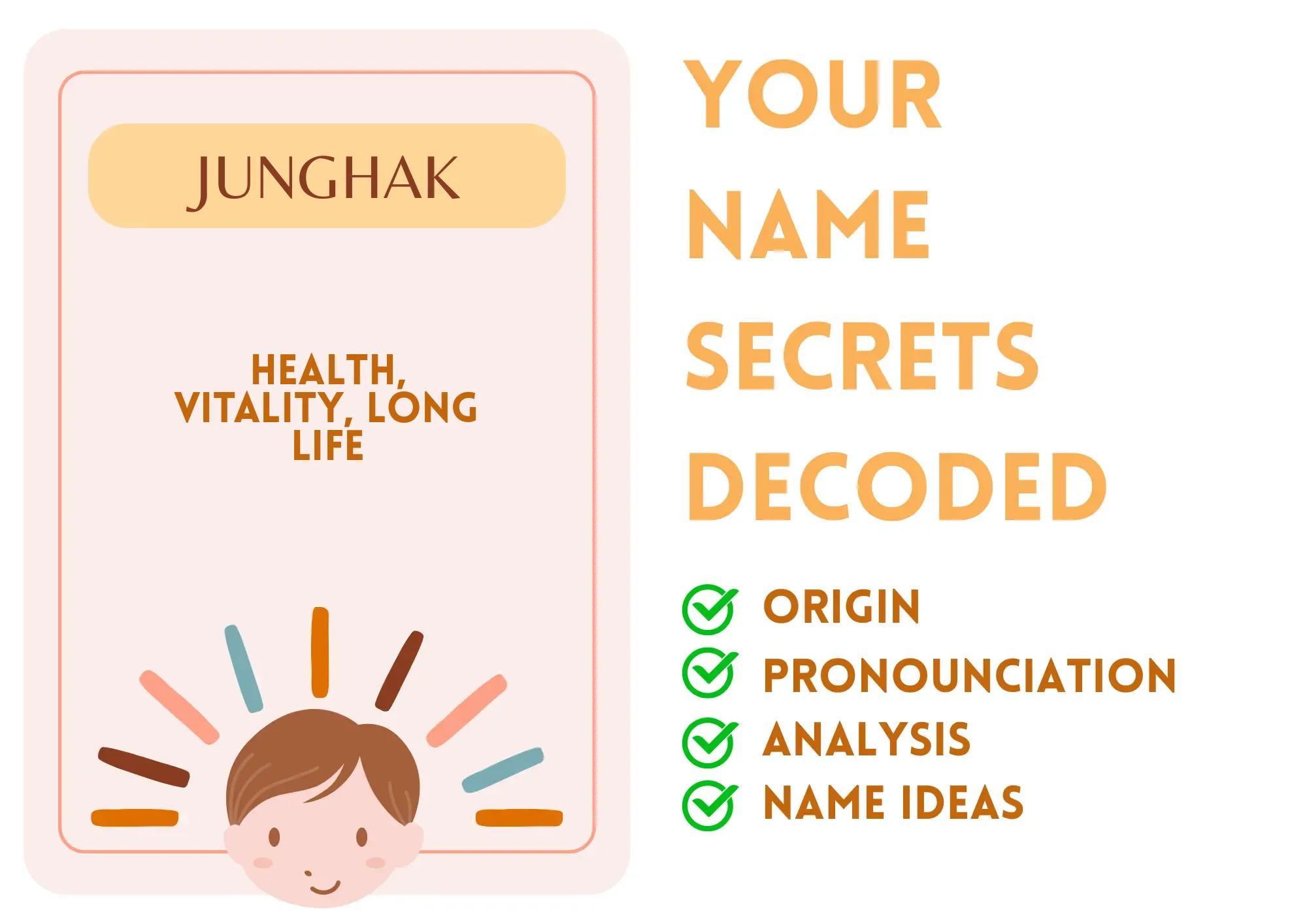
Junghak
Junghak is a name of Korean origin that translates to 'a person who cultivates good health' and embodies notions of long life and well-being. Commonly used in South Korea, the name is primarily masculine but can also be unisex. It reflects cultural values emphasizing the importance of health and vitality, often associated with traditional Korean philosophies regarding wellness.
The name Junghak evokes feelings of strength, vitality, and aspiration for longevity. It is relatively easy to write and pronounce for speakers familiar with Korean phonetics and is gaining recognition globally.
In popular culture, Junghak is less commonly found as a character name but resonates with individuals who appreciate traditional Korean names signifying well-being. Overall, Junghak is favored for its meaningful representation of health and strength, making it a cherished choice among parents.
Basic Information
Gender: Boy
Sounds Like: joong-hak
Pronunciation Explanation: The name is pronounced with the first syllable 'joong' rhyming with 'moon', followed by 'hak' pronounced like 'hawk' without the 'w'.
Summary and Meaning
Meaning: health, vitality, long life
Origin: The name Junghak has Korean origins, deeply rooted in the linguistic and cultural traditions of Korea.
Usage: Junghak is traditionally a masculine name, often attributed to boys, embodying ideals of strength and well-being.
Name Number (Chaldean)
Name Number (Pythagorean)
Popularity (Global Rank)
Overall: 397385
Boys: 72681
Most Popular in
Religious and Cultural Significance
Religion: Buddhism
Background: In Korea, names like Junghak can sometimes reflect Buddhist principles, emphasizing harmony, health, and spiritual well-being.
Cultural Significance: Junghak is appreciated in South Korean culture for its representation of health excellence and vitality, aligning with traditional practices surrounding medicine and wellness.
Historical Significance: Historically, names like Junghak are significant as they reflect the cultural emphasis on health and longevity in Korean traditions, often linked to Confucian and Buddhist teachings regarding balance and well-being.
Popular Culture
Literature and Mythology: While Junghak is not widely represented in traditional literature, it aligns with themes in Korean folklore that prioritize health and vitality.
Movies and Television: While less prevalent as a character name, names with similar meanings appear in Korean dramas, often depicting strong male protagonists who embody health and resilience.
Feelings and Perceptions
Perception: Junghak is generally viewed positively, symbolizing strength and the pursuit of well-being. It is admired for its cultural depth and significance.
Positive Feelings: Strong, vibrant, healthy, aspirational, culturally rich.
Negative Feelings: Some may find it challenging to pronounce or spell correctly due to its Korean origins.
Practical Considerations
Ease of Writing and Calling: Junghak is moderately easy to write and pronounce for those familiar with Korean names. It consists of two syllables and is relatively compact, making it memorable.
Common Typos and Misspellings: Jung Hak,Junghack,Jung Hakk,Junhak
Common Nicknames: Joon,Hak
Junghak Popularity
Junghak Usage and Popularity By Country
| Country | Rank (Overall) |
|---|---|
| South Korea | 2185 |
| Canada | 149654 |
| United States | 344452 |
Junghak Usage and Popularity By City
| City | Rank (Overall) |
|---|
Compatibility Analysis
Famous Persons Named Junghak
No results found for Junghak.
Related Names
Similar Sounding Names:
Joonhak,Seunghak,Yunghak